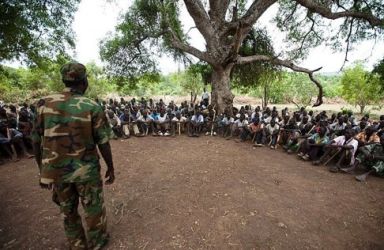Washington and London urge Juba to stop supporting Sudanese rebels
March 23, 2012 (KHARTOUM) — Washington and London have expressed support for the upcoming presidential meeting between Sudan and South Sudan and urged Juba to stop its support to the Sudanese rebels who fight the government troops in the border regions.

“I urge the Government of Sudan to stop bombarding civilian areas immediately, and the Government of South Sudan to stop providing military support to the Sudanese People’s Liberation Movement (North),” said Bellingham on Friday.
“We also demand that South Sudan end any military support for the SPLM-N and work with the Government of Sudan on ways jointly to bring peace to the border region,” said Nuland, on Thursday after demanding that Khartoum stops the bombing of civilian areas and to allow humanitarian access to the rebel held zones in the South Kordofan and Blue Nile.
The Sudanese government has for a longtime accused the American administration for supporting Juba and encouraging Sudanese rebels to achieve regime change in Khartoum. Sudanese officials accused some members of Obama’s Administration particularly Susan Rice for pushing to support the rebels.
However, Obama’s envoys to Sudan and South Sudan warned that the conflict in the South Kordofan and Blue Nile might lead to a large-scale war between the two countries. He and his Senior Adviser on Darfur, Dane Smith also discreetly pressed Juba to stop its support to their old comrades in North Sudan and to their allies from among Darfur’s rebels.
More, in November 2011, the White House Deputy National Security Adviser Denis McDonough flanked with Lyman told President Salva Kiir that his government must stop its support to the SPLM-N rebels. After what, the white House issued a statement on reiterating Washington’s position.
Western diplomats said the presence of the Sudanese rebels in Juba and South Sudan generally has been a secret since last year and they have to say something about it if they want to preserve their credibility and talk with Khartoum about peace.
Washington and London called also on the Sudanese government and the SPLM-N to sign a cessation of hostilities agreement and to return to the negotiating table.
The issue of a ceasefire was raised in Addis Ababa by the African Union mediators and US envoy to Sudan Princeton Lyman during a series of meetings on 9-10 March with the SPLM-N leadership which demands an international humanitarian intervention in South Kordofan and Blue Nile.
The SPLM-N, which hopes to achieve some military victories mainly in the Blue Nile before re-entering political negotiations, rejected the demand of truce formulated by the Sudanese government before allowing humanitarian access in the Nuba Mountains, South Kordofan. The rebels told the mediators that they are ready for “a humanitarian secession of hostilities whenever the modalities of delivering humanitarian assistance require it.”
Yasir Arman, SPLM-N Secretary General, has pointed out a different times that there no way to mix the humanitarian aid with the political process. He accused Khartoum of using food as weapon to extract concessions. He also said that a ceasefire should be part of a political negotiations.
The Sudanese and South Sudanese presidents are scheduled to meet in Juba on 3 April. The meeting will witness the signing of two agreements on the demarcation of agreed borders and a four freedoms agreement.
Also, South Sudan’s top negotiator on the outstanding issues, Pagan Amum, and his delegation agreed with his Sudanese counterpart, during a meeting held in Khartoum on Friday to resume talks on security issues including rebel groups and to reach a deal before the presidential summit.
The American and British officials expressed hope that the upcoming meeting will sustain the momentum to reach an agreement over all the pending issues including oil transit fees and Abyei.
“I call on both governments to take steps immediately to fulfill their commitment to establish a safe demilitarized border zone, to be jointly monitored by UN peacekeeping forces and the armed forces of both countries” said the British minister.
Bellingham was referring to a non aggression pact signed on 10 February by the two countries. The mediation thought that the deployment of the international force working now in Abyei can be the next step to calm tensions.
(ST)
